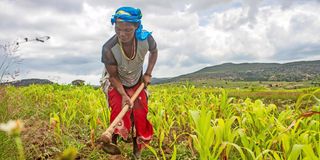Ministry drafts soil management policy

A woman weeds maize crops. A 2014 soil fertility survey showed over 50 per cent of soils across Kenya had below critical levels of soil pH, nitrogen, phosphorus, potassium, zinc and copper.
What you need to know:
- The National Agricultural Soil Management Policy (NASMP) is expected to facilitate restoration and maintenance of agricultural soils to increase productivity, improve food security and contribute to poverty reduction.
- The policy will facilitate the establishment of an accurate climate early warning system to enhance preparedness in managing sudden climate variability and weather extremes.
- Research has shown that farmers are getting barely 25 per cent of their potential yields.
The Ministry of Agriculture has formulated a soil management policy to help in the protection of soils from degradation amid rise in pressures that include climate change, erosion and poor fertiliser use.
The National Agricultural Soil Management Policy (NASMP) is expected to facilitate restoration and maintenance of agricultural soils to increase productivity, improve food security and contribute to poverty reduction.
“Research has shown that farmers are getting barely 25 per cent of the potential yields. The difference arises from among other factors, inadequate supply, maintenance and management of plant nutrients, as well as poor tillage practices,” notes the draft policy released this week.
Below critical levels
The policy will facilitate the establishment of an accurate climate early warning system to enhance preparedness in managing sudden climate variability and weather extremes.
“We need to prepare for future challenges and enhance the soil’s capacity to adapt to pressures under a changing climate,” said Peter Munya, the Cabinet secretary, Ministry of Agriculture.
A 2014 soil fertility survey showed over 50 per cent of soils across the country had below critical levels of soil pH, nitrogen, phosphorus, potassium, zinc and copper.
Farmers, agriculture experts and other stakeholders are expected to offer views on the document before it is finalised for implementation.





